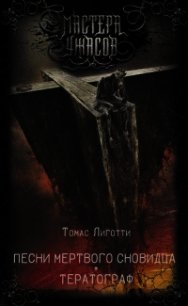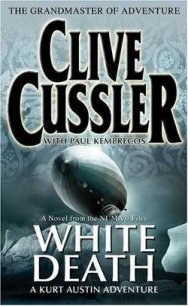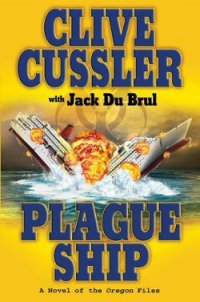Corsair - Cussler Clive (полная версия книги TXT) 📗
Fiona caught Grace’s eye just before she was hauled away. She had somehow managed to stifle her tears. Grace, too, realized what was about to happen.
“God bless you,” Grace mouthed.
“You, too,” Fiona replied silently, and then she was outside, being manhandled down to the ground.
They took her about a hundred feet from the aircraft and forced her to her knees, her wrists cuffed behind her back. Through the small cockpit window she could see the young man fiddling with the controls. She also saw that there was a hole in the plane’s tail section. It looked like a missile had struck the plane but hadn’t exploded. Which, she assumed, was the point. They wanted her but wanted the world to think she was dead.
The last of the terrorists finished securing the people left aboard. The suicide pilot stepped from the cockpit and hugged the last gunman at the door’s threshold. He paused there, waving to the others, who cheered him riotously. When the gunman was on the ground and the ladder hauled away, the pilot closed the hatch and retook his place in the cockpit.
Tears were running down Fiona’s cheeks. She could see faces pressed to the aircraft’s windows. Those were her people—men and women she had worked with for years. For them, she would show no weakness, and she willed herself to stop crying.
The working engine fired up, its howl building until it hurt her ears. There had been vehicles hidden along the dirt strip under camouflage tarps, one of which was a small utility tractor like those seen at airports the world over. It approached the big plane’s front landing gear, and the driver attached a tow hook.
It took several minutes for him to position the plane at the foot of the compacted-earth airstrip. Another moment passed before the engine beat changed and the Boeing started accelerating down the runway.
Fiona prayed that the damage done by the missile strike was severe enough to prevent the aircraft from reaching its takeoff speed, but with so little fuel in the tanks and so few passengers on board she could see it gaining speed rapidly. It flashed by her, its exhaust like a reeking hot breath. The terrorists were firing their AKs into the air, cheering as the plane’s nosewheel slowly lifted from the ground. It hung awkwardly for a long moment and then the tail struck the gravel strip, a result of the damage and the inexperience of the pilot.
The nose started to fall back to earth, and Fiona was sure her prayers had been answered. They were running out of graded runway. He wouldn’t be able to take off.
And then the plane rose majestically into the air at a slight tilt. The cheering redoubled, and the amount of ammunition pumped into the sky was staggering.
Fiona bit her lip as the jetliner slowly gained altitude. She had no idea how far they were going to take it. For all she knew, they were headed for Tripoli, to crash it into the conference hall where the peace summit was to be staged. Yet none of the terrorists acted as though they were ready to leave. They all looked skyward as the aircraft shrank into the distance. She couldn’t bear to watch but couldn’t tear her eyes from it.
The plane started to wing over, its nose now pointed at a hill some distance away. The pilot made an effort to regain control, and for a moment the aircraft leveled. Then in one violent maneuver it flipped completely onto its back. It slammed into a hill with enough force to shake the ground. Chunks of it went spinning away. The wings separated from the fuselage before bursting into flame. One of the engines tore free of the conflagration and somersaulted up the hill, kicking up gouts of earth. Dust blown up by the impact obscured the scene for many moments before slowly dissipating. The wings burned on while the white tube of the fuselage rolled safely out of the fire’s reach.
Fiona gasped while the men around her roared with approval.
Even from this distance, she knew no one had survived. Though they had been spared the horror of burning alive, no one could have lived through such a violent crash. Off to her side, just out of earshot, several of the terrorists began speaking in low, earnest tones. She could tell by their body language that they were disappointed that the plane hadn’t burned more thoroughly, and were probably deciding how best to proceed.
Across the runway, a tarp was pulled off a large earthmoving machine. Its engine bellowed, and soon it began erasing the evidence of the landing by systematically tearing up the strip they had graded to lure Fiona’s pilots into landing there. At the pace they were going, in just a few hours no trace of their presence would remain.
The meeting ended abruptly. The person Fiona assumed was the group’s leader issued orders to the others. She missed most of it, but did hear, “Make sure to remove any trace that the plane was hit by a missile, and don’t forget the handcuffs.” He finally approached her where she knelt on the stony ground.
“Why have you done this?” she asked in Arabic.
He leaned in close. All she could see were his eyes, dark pools of insanity. “Because Allah willed it to happen.” He called to one of his men. “Bring her. Suleiman Al-Jama will want to inspect his prize.”
A hood was tossed over her head, and she was manhandled into the back of a truck. The next time she was allowed to see, she was here in this cell, covered in a kind of burqa she recognized as the Afghani chadri. Her entire body was covered except for her eyes, which were shielded by a fine mesh of lace.
The noise she had heard that ended the concert in her head was a key being rammed into the lock and the bolt thrown. The door squealed open. She had yet to see any of her captors’ faces, other than the suicide pilot and the man she’d grappled with on the plane. The two men who filled the doorway were no different. They wore matching khaki uniforms without insignia and traditional headscarves.
One of them actually snarled when he saw she had managed to tear herself free of the burqa despite her cuffed hands. Averting his eyes so as not to look her in the face, he recovered it from where she’d been using it as a pillow and quickly draped it over her head and body.
“You will show respect,” he said.
“I recognize your accent,” Fiona replied. “You’re from Cairo. The Imbaba slums, if I’m not mistaken.”
He raised a hand to strike her but stopped himself. “Next time, my fist flies if you dare speak again.”
The guards took her from her cell and led her outside the prison building. She was actually grateful for the lace mesh, which protected her eyes from the brutal glare of the sun pounding against the desert floor. She could tell by its angle that it was late morning, but the heat wasn’t as bad as it should have been. They were higher in the mountains, she decided.
Keeping track of details like that and playing classical music in her head helped Fiona keep from dwelling on her predicament and the fate of her friends and staffers.
The terrorist camp looked like the hundreds she’d seen in surveillance pictures. There were a few wind-battered tents tucked up against a cliff that was pockmarked with countless caves. The largest, she knew, would be their last redoubt if the camp were ever attacked, and she had no doubt it was rigged with enough explosives to take down half the mountain.
A drill instructor was leading a batch of men through calisthenics on a parade ground. Judging by the crispness of their movements, they were nearing the end of their training cycle. A little ways off, in the lee of the mountain looming over the camp, another group was gathered to live fire AK-47s. The targets were too far away for Fiona to judge their accuracy, but with the amount of money funneled into terrorist groups such as Al-Jama’s they could afford to waste rounds training even the worst recruit.




